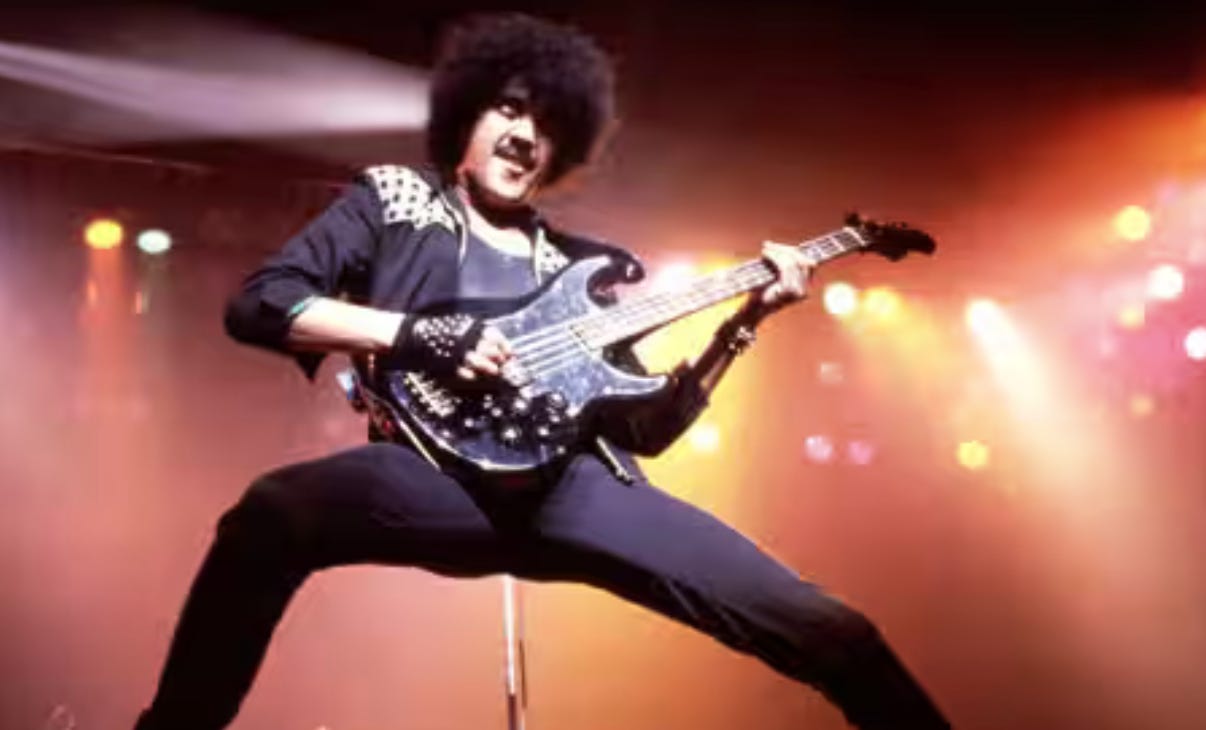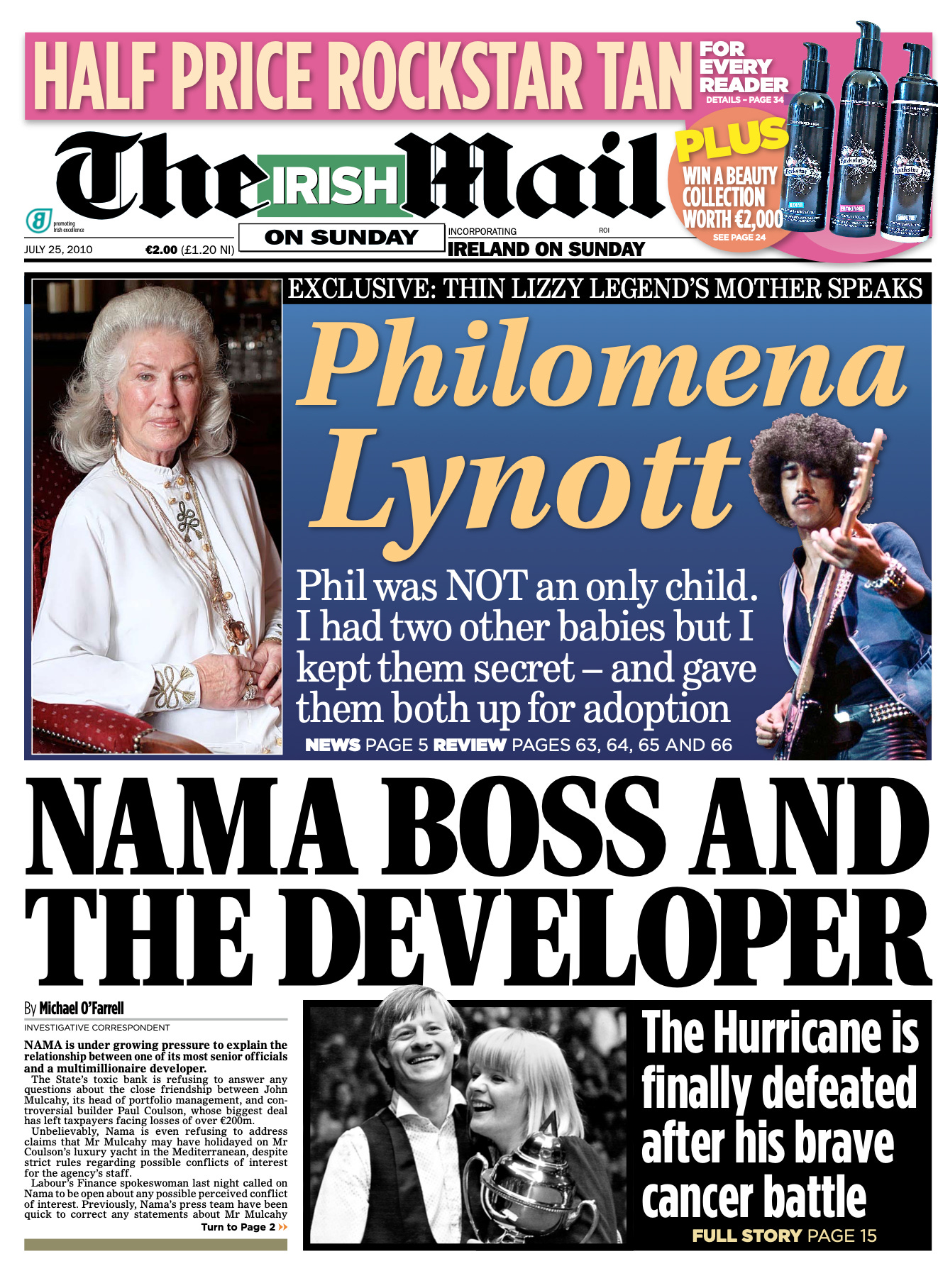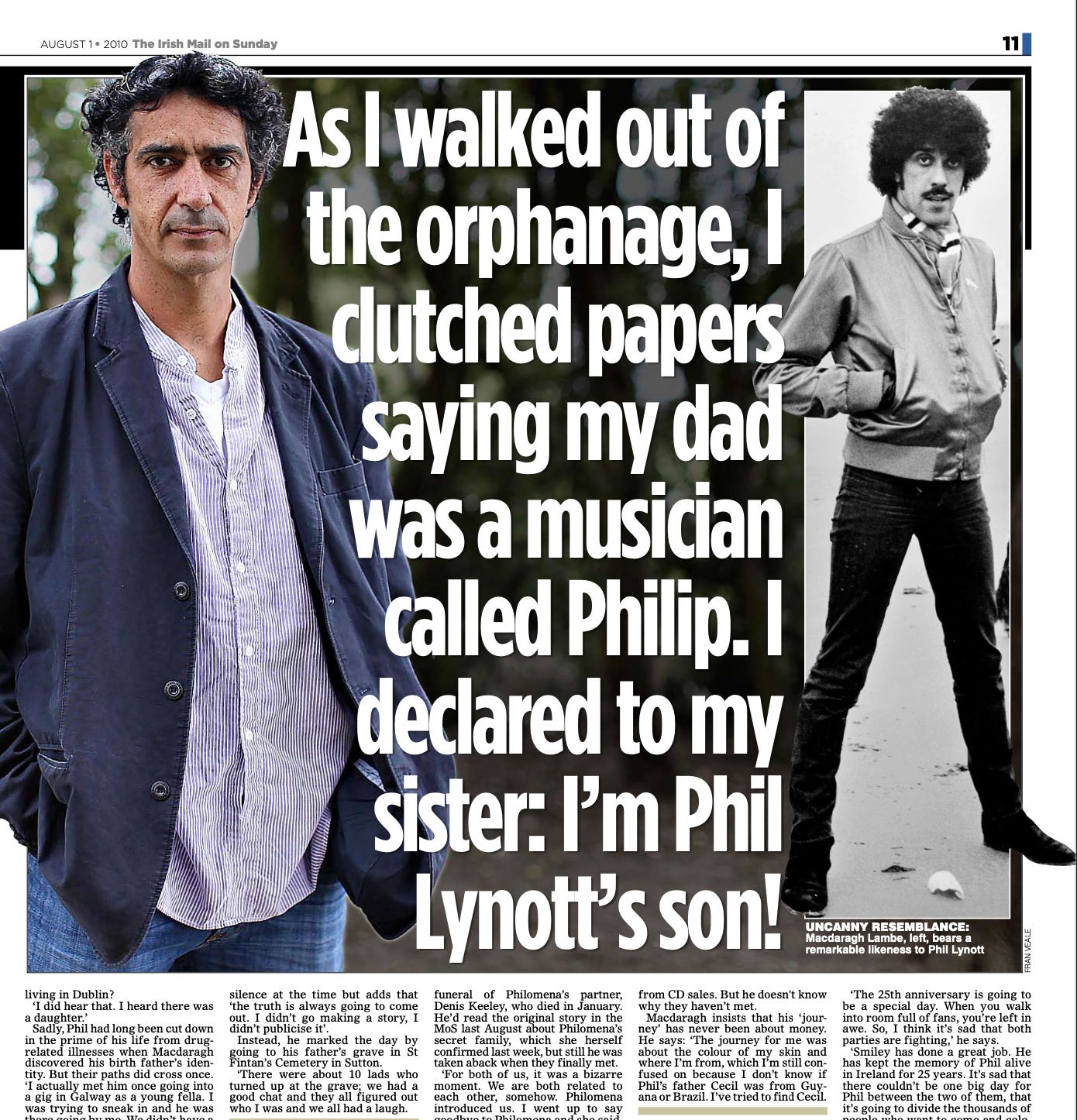Sit-down Sunday: An Interview with Phil Lynott’s love child...
"As I walked out of the orphanage, I clutched papers saying my dad was a musician called Philip. I declared to my sister: I’m Phil Lynott’s son!"
Growing up, Macdaragh Lambe was often told that he bore an uncanny resemblance to Phil Lynott.
So, when the Galway-based sculptor finally came forward in his mid-30s to reveal himself as the lovechild of one of the world’s greatest rock icons in an exclusive interview with Irish journalist and author Olaf Tyaransen, the sceptics immediately wondered if there was a touch of the far-fetched fantasist about his unbelievable story.
In the doubters’ eyes, the only evidence confirming his story was circumstantial at best – adoption papers stating that his father was a ‘musician’ named ‘Philip’. They also conveniently ignored the fact that Macdaragh’s biological mother, it turned out, just happened to be an ex-girlfriend of the Thin Lizzy star.
But any lingering doubts vanished forever when Phil’s mother, Philomena Lynott broke her silence on Macdaragh and finally acknowledged him in an extraordinary 11-page interview with me in the Irish Mail on Sunday and Irish Daily Mail, which ran over three days in 2010. In it, Philomena also revealed she had given two of her other children secretly up for adoption. Macdaragh was ‘without a doubt’, she told me, her grandson.
‘I was in the middle of work, having a really bad week, and I got a text from my birth mother explaining that I was mentioned in the Mail. What Philomena said was lovely – that I have Philip’s thumbs and his eyes,’ Macdaragh told me shortly after his grandmother’s interview in 2010.
He added that ‘publicly, it was very nice’ for his then 16-month-old son Rory, ‘as he won’t have to be questioned now growing up about his identity. It’ll be a lot easier for him to now say who he is.’ Rory must be in his mid-teens now. How time flies.
Macdaragh also said at the time that he would be willing to take a DNA test if Philip’s ex-wife, Caroline, and his two half-sisters, Sarah and Cathleen, didn’t accept Philomena’s acknowledgement and the adoption papers as enough evidence of his linage. ‘If they want one, then they can have one. I don’t really need it.’
With the 25th anniversary of Phil’s tragic death rapidly approaching at the time of my interview with Philomena Lynott, Macdaragh said he had anticipated some revelations might be revealed about his father’s family history – but he admitted that nothing could’ve prepared him for the ‘total shock’ of opening the paper to read his grandmother’s extraordinary confessions about her secret family. She had originally claimed to the world in her memoir My Boy that she only ever had one child that she had given up for adoption. Yet in her in-depth interview with me, she revealed that two other children had also been secretly given up, making it three children in total.
It was ‘courageous’ of the late Philomena, he said, to admit that she had lied in her autobiography about the Thin Lizzy singer being her ‘only son’ and to reveal how she secretly had two other illegitimate children.
‘We all thought that Philip was an only child. It was a total shock. It’s a nice acknowledgement for them – her daughter and son – as well as me because we were all adopted. It has to be nice for them to be acknowledged publicly by their mother. You can only be grateful,’ he said.
‘It couldn’t have been easy for her and my heart went out to her when reading it. It was a very courageous decision of hers to acknowledge all of us in the story. Well done to her.’
Growing up, Macdaragh ‘always knew’ that he was adopted. It was ‘obvious’ from the colour of his skin that he was ‘different’ from his ‘big family’ of three brothers and two sisters raised by Oliver and Martine Lambe in Co. Kildare.
As a teenager, he would often hear people remark that he looked like Phil Lynott but that could have been simply down to the colour of his skin and the fact that he at one stage modelled his fashion style on what he saw Lynott wearing on television. But he never really ‘believed’ that he might have been related to the superstar.
When he was 18 years old, Macdaragh made his first tentative steps to seek out his birth parents. ‘I remember getting the address of the orphanage and driving up and parking outside it but I never went in. I was too upset. I obviously wasn’t mentally ready for it. It is a very difficult thing to go and do for anybody as an adoptee. It’s not an easy journey,’ he said.
He lovingly described his adoptive mother and father as his real parents because ‘they made me who I am’, but it wasn’t until they had died that he finally found the courage to track down his birth parents.
‘I had all the opportunity to do it when they were alive. It was through a conversation with a friend of mine who was going to have a child when it all came out. “Jesus! You never wonder?” my friend asked. “I suppose now is as good as any time, if I don’t do it now they’ll be dead”. That’s why I did it and it wasn’t for any other reasons.’
After leaving the orphanage, clutching the adoption papers with that ‘bit of information’ about his father – obviously a black man – being ‘a musician named Philip’, Macdaragh turned to his sister who was with him for moral support and declared: ‘My dad is Phil Lynott.’
Within 10 days of this shocking discovery, Macdaragh finally met his birth mother, who ‘confirmed’ that one of Ireland’s most famous men was his father. She told him that she was only 18 years old when she fell pregnant in 1968, but the shame of having a child ‘out of wedlock’ meant that he was given up.
‘They had a decent relationship, a couple of years together. When I did find out that it was Philip, it opened a can of worms and you can’t put it back into the can again,’ he explained.
Recalling that first meeting with his mother in 2001, he said: ‘It wasn’t a tearful time, it was a joyful time. Brilliant. Emotionally, it was draining. That whole time was very hard work in ways you can’t even imagine.
‘You’ll get the shakes after it. It’s a very trying time on you. You don’t know how the other person is going to react; you don’t know their story; you don’t know their circumstances.
‘I had done my homework: if you’re an adoptee going to meet your parents, you take it very slow because it can go wrong in an instant. One thing out of place can upset the other person.
‘We are now the best of friends. Birthdays, Christmases, Christenings. Any time we want to go to Dublin we call in, with my son, and we go to dinner.’
Did Phil know that he had a son given up for adoption?
‘I don’t know if he knew she was pregnant at the time but he found out afterwards. My mother and Philip had met afterwards and she told him. I don’t want to be talking too much about my mum’s stories because they are her stories. She has opted to be kept out of this. It’s her privilege to stay away from the papers.’
He added ‘I think Philomena found it hard to understand that she didn’t know [about me]. I don’t think Philip had told her. For her, that probably was hard and then I’m sure she asked a lot of questions from Smiley Bolger and all those people. But she did acknowledge me.’
Has Macdaragh heard the rumour that Phil might have another love child living in Dublin? ‘I did hear that. I heard there was a daughter.’
Sadly, Phil had long been cut down in the prime of his life from drug-related illnesses when Macdaragh discovered his birth father’s identity. But their paths did cross once. ‘I actually met him once going into a gig in Galway as a young fella. I was trying to sneak in and he was there going by me. We didn’t have a conversation but he was there in front of me.’
I’d imagine that visiting his father’s grave for the first time was very poignant.
‘Yes, that was hard. Most of the times you go to visit his grave it is hard. There are very few times that I have ever been my own, as there are always people coming to visit.’
Macdaragh was nowhere to be seen at the unveiling of Phil’s statue in 2005 on Harry Street, off Grafton Street in Dublin.
‘The day the statue went up was a tough day because I wasn’t invited. That was the hard bit,’ he said, adding that ‘of course’ he was insulted not to be included in the event. He stresses that he kept a dignified silence at the time but added that ‘the truth is always going to come out. I didn’t go making a story, I didn’t publicise it’.
Instead, he marked the day by going to his father’s grave in St Fintan’s Cemetery in Sutton.
‘There were about 10 lads who turned up at the grave; we had a good chat and they all figured out who I was and we all had a laugh,’ he told me.
‘I got warned that the press were looking for me in town, waiting for me to be at the statue. There would have been controversy and I didn’t want controversy on that day. I went by the statue that night with my mum and sister. It was a bit mad but cool.’
He met his father’s adopted brother. The two met at the funeral of Philomena’s partner, Denis Keeley, who died in January 2010.
‘For both of us, it was a bizarre moment. We are both related to each other, somehow. Philomena introduced us. I went up to say goodbye to Philomena and she said, “This is such and such”. It was very brief,’ he said.
‘But it was shocking because I had just seen my two sisters earlier and Philip’s wife; I wasn’t introduced to her and I didn’t get to talk to them but I literally stood 10 inches from them. It was the first time I’d seen them, other than pictures.’
He revealed that he ‘tried to make contact years ago’ with Caroline and her children, ‘but I probably went about it the wrong way’. He added: ‘They know now. They’ve known for a number of years.’
Perhaps they were reluctant to meet because they feared Macdaragh would pursue them for a percentage of Phil’s lucrative estate – one that continues to grow thanks to the royalties still being garnered from CD and vinyl sales.
But Macdaragh doesn’t know why they haven’t met and insisted that his ‘journey’ has never been about money. He said: ‘The journey for me was about the colour of my skin and where I’m from, which I’m still confused about because I don’t know if Phil’s father Cecil was from Guyana or Brazil. I’ve tried to find Cecil. If he’s alive, I’d love to meet him.’
His dad Phil would have been 75 earlier this year. It is hard to believe that The Vibe For Philo tribute concert held every January on his birthday will soon enough mark its 40th anniversary. ‘When you walk into a room full of fans, you’re left in awe,’ he said.
On a personal level, he said the anniversary has always been an emotionally charged week for him. ‘I lost Daddy Lambe on New Year’s Eve and then I lost Daddy Lynott four days later. It’s a tough week.’
He wished both his fathers had been alive to meet their grandson but adds that fatherhood has helped him deal with the pain. He also said that being adopted has made him very conscious of cherishing every single moment with his son – a boy Philomena acknowledged was her great-grandson.
But, as Macdaragh jokingly remarked, that recognition could be a heavy burden if Rory ever tried to follow in his grandfather’s rock’n’roll footsteps...




